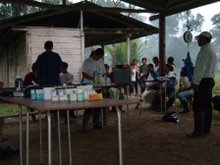
In a previous post I explored the possibilities of public-public partnerships (PUPs) in establishing vital infrastructure (e.g., water, electricity, city planning) to combat poverty.
This entry is all about public-private partnerships (PPPs), and the case for their potential to alleviate global poverty is unequivocal. PUPs simply cannot compete with the powerful combination of yin and yang that results from public-private collaboration.
First off, for a great list of various PPP models and a diagram of where each lies on the spectrum of public/private risk involvement, see the Canadian Council for PPPs website.
We all know what the public and private sectors stand for. The public sector is concerned with meeting basic needs and ensuring social justice. The private sector is innovative and profit-driven. Inherent in both sectors are problems that endanger human welfare. What happens when you put the two together? With the right leadership, you could have an integrated mechanism for sustained human development.
A little background: in the late 1990s, the IMF and the World Bank implemented the now heavily criticized Structural Adjustment Programs (SAPs) in developing countries to manage debt and reduce poverty. The SAPs emphasized trade liberalization, which, in the way it was implemented, might be described as mutton dressed as lamb...developed nations open up their markets for trade with less developed countries (LDCs), and then heavily subsidize exports so that LDCs with newly open market policies cannot compete. SAPs have been replaced by another acronym, PRSPs (Poverty Reduction Strategy Papers), which are required by the IMF for a country to qualify for aid.
Ugandan President Musevani put it poignantly when he said, "We are asking for the opportunity to compete, to sell our goods in western markets. In short, we want to trade our way out of poverty."
Trade liberalization can do that, but most LDCs are not at the point yet where they can compete with developed nations' subsidies. PPPs could be useful here. What is needed is federal government stewardship over "free" trade. LDC governments must seize back ownership of their economies, develop criteria for collaborating with international partners in the private sector, pick those partners wisely, and ease into financial mechanisms that work toward Musevani's plea.
"Our job is not to give people fish. It's not to teach them how to fish. It's to build a new and better fishing industry."
-Bill Drayton of Ashoka Alliance
On a side note: Where do you and I come in? We can be social entrepreneurs, who seem to be able to harness the yin and yang and everything in between. See these videos of successful innovators for inspiration:
Ashoka Alliance founder Bill Drayton
Grameen Bank founder Muhammad Yunus





2 comments:
[url=http://hairtyson.com]buy Phen375[/url] are tablets that resist slacken up on body weight. One of these tabs has to be captivated with fizzy water be illogical, round 20 minutes before a meal, twice a day.
[url=http://garciniacambogiaselectz.weebly.com]
garcinia cambogia and weight loss[/url] is the best obese on fire wring readily obtainable in hawk contemporarily a days. Yield upto 10 kg in 1 month. garcinia cambogia select
Post a Comment